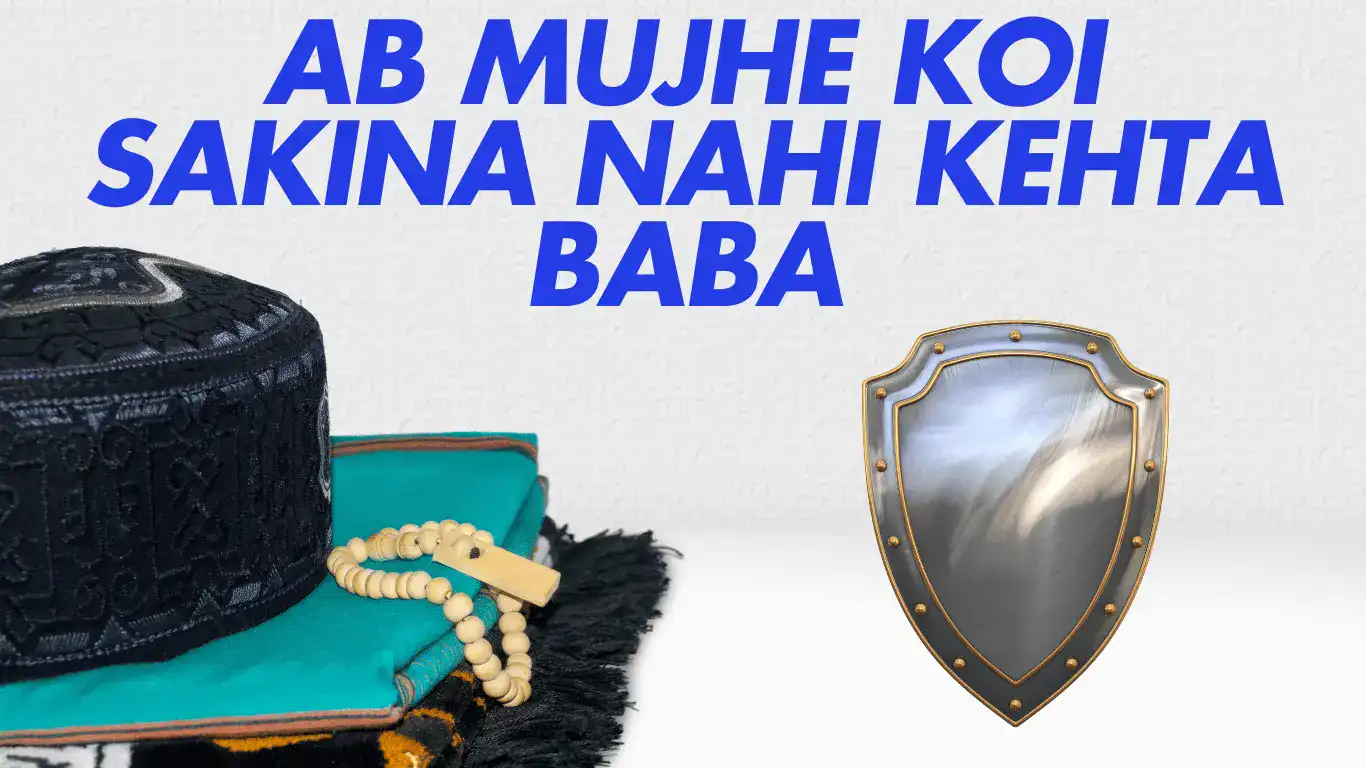The heart-wrenching poetry of Ab Mujhe Koi Sakina Nahi Kehta Baba captures the deep sorrow and suffering of Bibi Sakina (AS), the beloved daughter of Imam Hussain (AS). These lyrics profoundly express the pain and trials endured by her during and after the tragedy of Karbala. Each verse tells a story of unimaginable grief, love, and loss, making it a powerful piece that resonates deeply with the audience.
| Wah Kya Judo Karam Naat Lyrics in Urdu |
| Naat Taiba Ke Jane Wale Lyrics in Urdu |
| Naat-e-Rasool Tanam Farsooda Jaan Para Lyrics |
| Naat Jaga Ji Lagane Ki Dunya Nahi Hai Lyrics |
1: Ab Mujhe Koi Sakina Nahi Kehta Baba
“Now no one calls me Sakina Baba.”
This opening line sets the tone for the entire poem. It reflects the loss of identity and innocence of Bibi Sakina after the events of Karbala. The once-cherished name “Sakina Baba” has been replaced with sorrowful titles like “orphan” and “prisoner.” The repetition of this sentiment throughout the lyrics emphasizes the depth of her despair and longing for her father, Imam Hussain (AS).
2. قیدی کہتا ہے کوئی کوئی یتیماں بابا
Translation: “Now I am called a prisoner or an orphan, Baba.”
These words illustrate the harsh realities Bibi Sakina faced as a captive. Her noble lineage was overshadowed by the cruel labels assigned to her. This verse serves as a poignant reminder of how the family of the Prophet (PBUH) was stripped of their dignity in the aftermath of Karbala.
3. میں بیاں کیسے کروں اپنی مصیبت تم سے
Translation: “How can I even describe my suffering to you?”
Here, Bibi Sakina expresses the indescribable pain she endured. Her grief is beyond words, and this verse calls attention to the physical and emotional scars left by the tragedy.
4. کیا کروں اپنے طمانچوں کی شکایت تم سے
Translation: “How can I complain about the slaps I endured?”
This verse highlights the inhumane treatment Bibi Sakina faced. The reference to “slaps” signifies the humiliation and physical abuse she endured at the hands of her captors. The imagery evokes a deep sense of empathy and sorrow among readers.
5. سنتی ہوں دادی نے کھایا تھا طمانچہ بابا
Translation: “I heard that my grandmother also endured slaps, Baba.”
This line draws a painful parallel between Bibi Sakina’s suffering and the past tribulations faced by her grandmother, Bibi Fatima (AS). It underscores the generational trauma experienced by the family of the Prophet (PBUH).
6. خون بےشیر سے اندازہ کیا تھا میں نے
Translation: “I recognized you by the blood on your face, Baba.”
This verse is a heartbreaking depiction of how Bibi Sakina identified her father after his martyrdom. It symbolizes the unimaginable pain of a daughter seeing her father’s lifeless body in such a state.
7. آپ کے سامنے جب شمر نے مارا بابا
Translation: “When Shimar struck me in front of you, Baba.”
This line is a powerful portrayal of the cruelty Bibi Sakina faced. The imagery of her being struck in the presence of her father’s body adds to the emotional weight of the lyrics.
8. میری آنکھوں سے بہے جاتے تھے آنسو اس دم
Translation: “Tears streamed from my eyes that moment.”
This verse vividly describes the helplessness and grief of a young child unable to defend herself. Her tears represent the collective sorrow of all who remember Karbala.
9. مجھکو ظالم نے کنیزی میں جو مانگا بابا
Translation: “When the oppressors asked to enslave me, Baba.”
This final verse encapsulates the degradation and humiliation Bibi Sakina endured as a captive. Despite her noble lineage, she was treated as a slave, symbolizing the extent of her suffering.
Ab Mujhe koi sakina nahi kehta baba lyrics in urdu
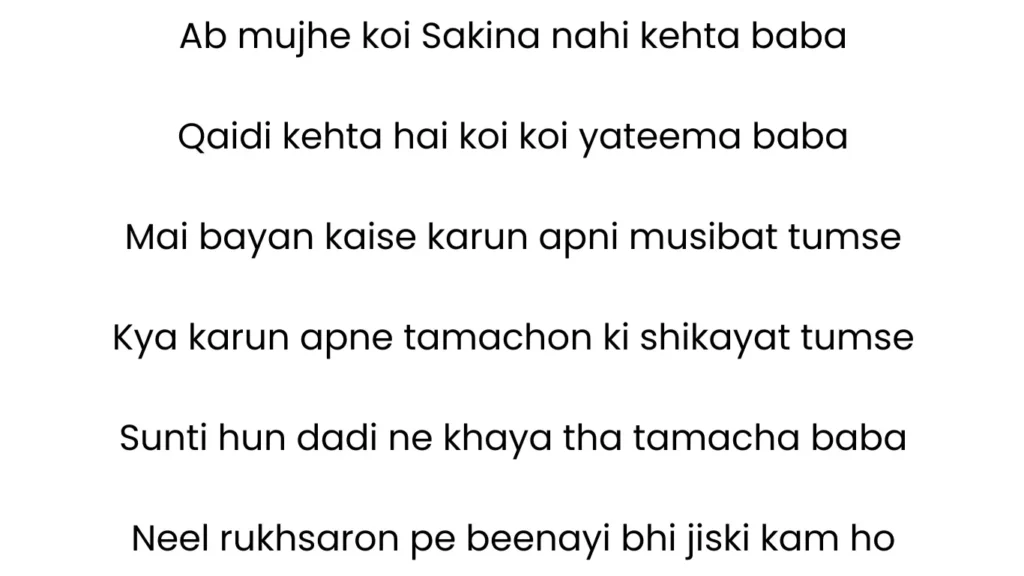
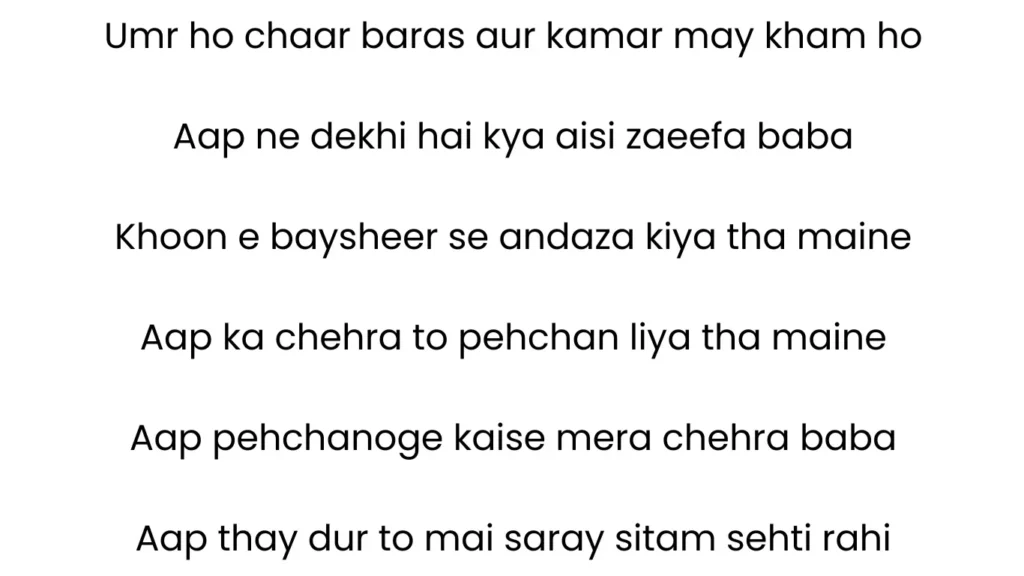
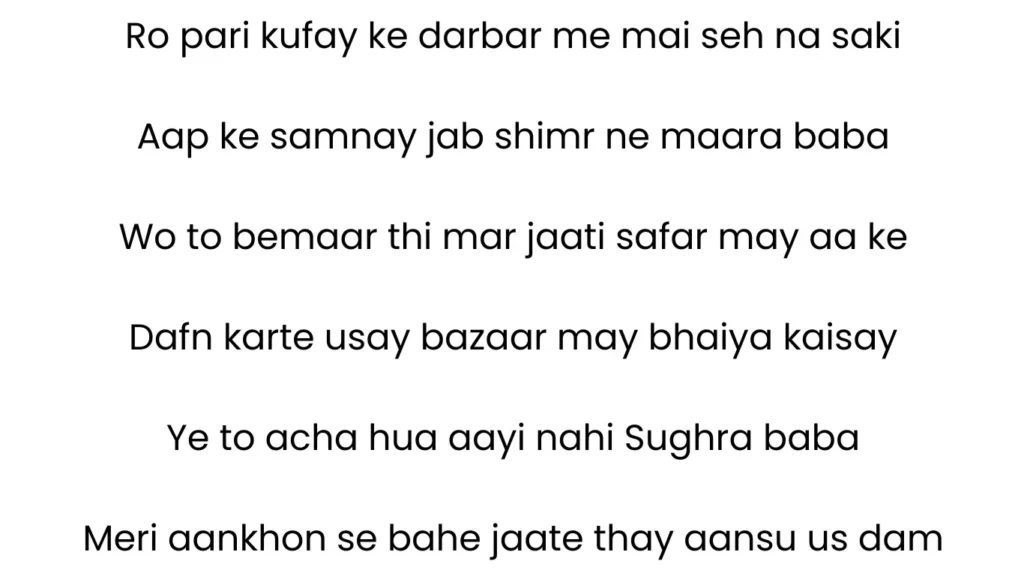
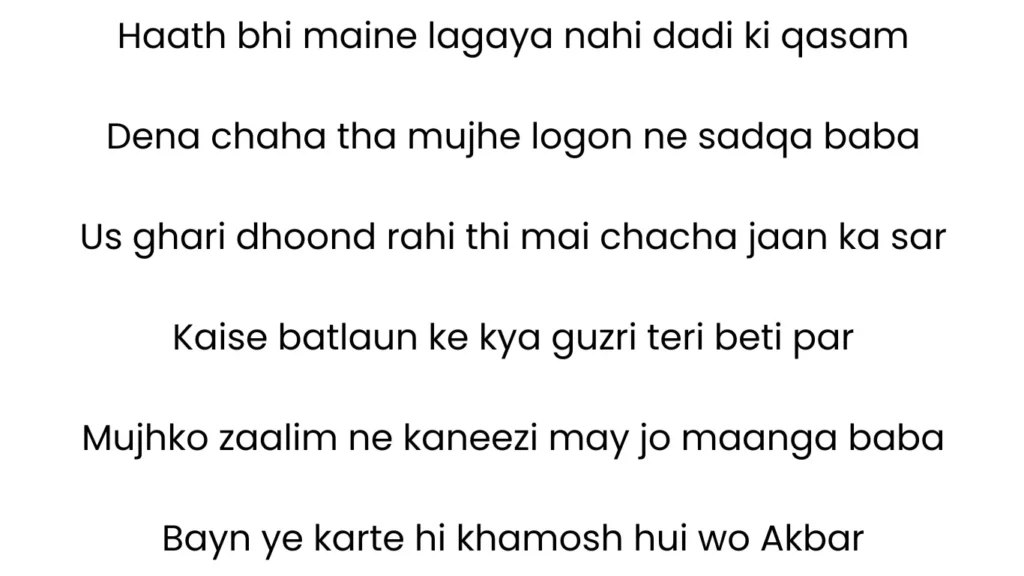
FAQs:
This phrase means, “Now no one calls me Sakina Baba.” It reflects the sorrow and loss of identity experienced by Bibi Sakina (AS) after the tragedy of Karbala.
Bibi Sakina (AS) was the beloved daughter of Imam Hussain (AS). She is remembered for her innocence, suffering, and unwavering patience during and after the events of Karbala.
Bibi Sakina’s story is a symbol of resilience and sacrifice. It serves as a reminder of the trials faced by the family of the Prophet (PBUH) and the lessons of faith, patience, and justice.
Conclusion
The lyrics “Ab Mujhe Koi Sakina Nahi Kehta Baba” are more than just words; they are a vivid depiction of Bibi Sakina’s unimaginable trials after the tragedy of Karbala. Each verse resonates with pain and love, drawing readers into the depth of her story. By reflecting on her suffering, we honor her legacy and keep alive the lessons of Karbala.
